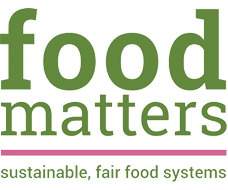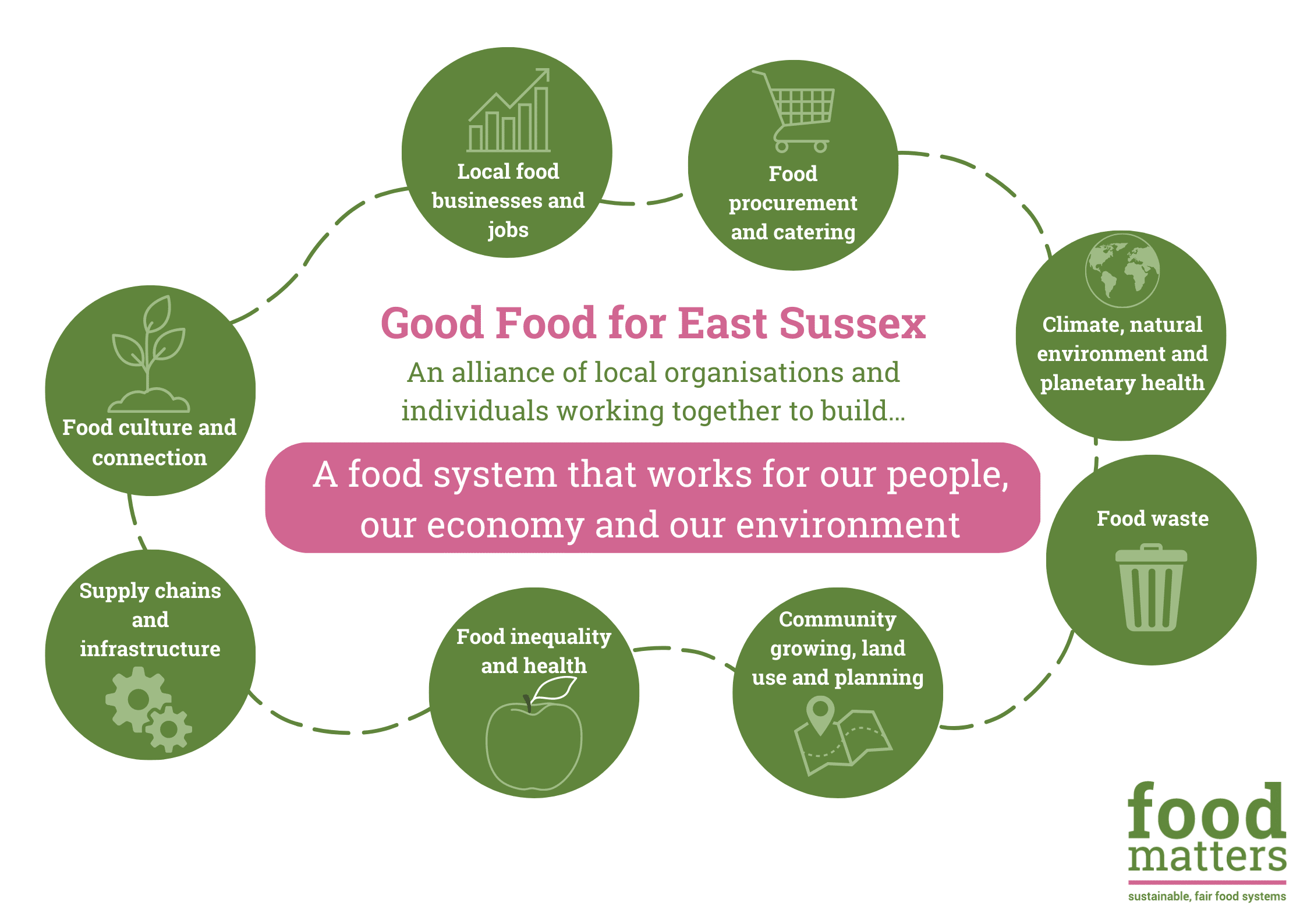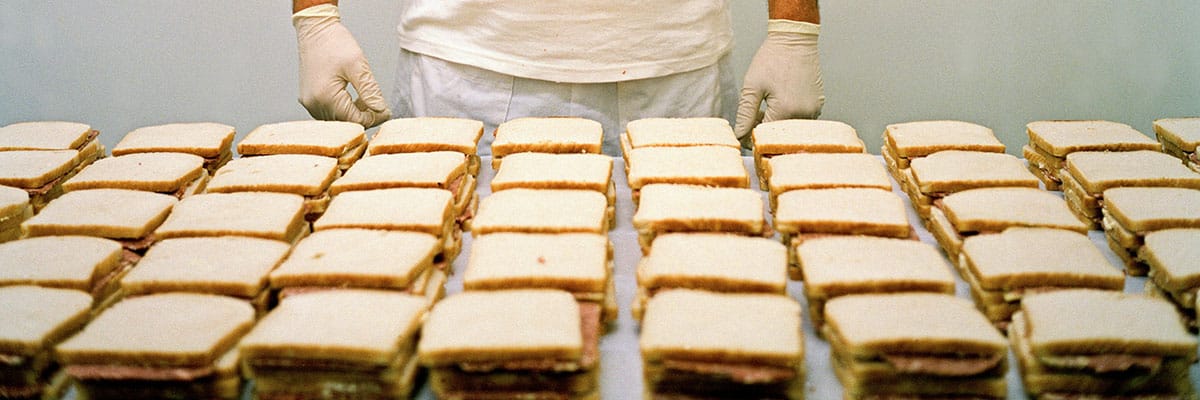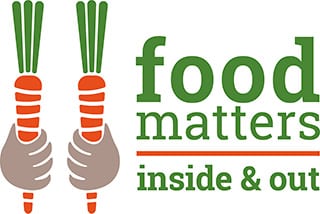Blog by Ruth Smart, April 2024
Good Food East Sussex (GFES) is a network of organisations and individuals working together to build a food system that works for people, economy, and environment. GFES recognises that the work of transforming a food system surpasses district or borough lines, and instead involves cooperation at multiple levels: district, county, national, and more.
GFES is organised by the five local district and borough food partnerships that make up the East Sussex area: Lewes, Hastings, Rother, Wealden, and Eastbourne, and until recently was facilitated by us at Food Matters. Food Matters was commissioned to bring the food partnerships together, to identify potential county-level mechanisms for sustainable food system working by facilitating the development of a strategic plan outlining how district and borough-based food partnerships could operate, influence and change at county and regional level.
What did it look like to work as food partnerships at county level? Why was it necessary to do this? What was it like working with us, Food Matters, in this process? Seeking answers to these questions, we spoke to Johnny Dennis of Eastbourne Food Partnership about his experience of the Good Food East Sussex programme, and what lies ahead for the organisations involved in this collaboration.
Johnny, can you tell me about your role at Eastbourne Food Partnership (EFP)and what you do there?
I’m the coordinator at Eastbourne Food Partnership. I’m responsible to the board of directors and I’m responsible for the overall programme of what we deliver and manage in Eastbourne.
Nice. What is the programme that you’re trying to deliver in Eastbourne?
We’re quite new. EFP is a community interest company started about 18-months ago, and I took over in October. Our big plan for this year is to celebrate Good Food Month in October and to have a food event bringing together multiple partners, hopefully on the 4th October. We’re hoping to do this in collaboration with Eastbourne Borough Council, as we continue to build our relationship. We’re trying to foster the idea of a good food culture in Eastbourne because it’s not currently a place that is associated with good food. We want that idea to take up a more prominent position in people’s thinking.
So, why did Eastbourne Food Partnership get involved with the Good Food East Sussex movement?
While the formation of GFES was before my time, it is clear that the act of sharing information and bringing people together is incredibly valuable. Across East Sussex, the food partnerships all work at a local district or borough level, and that can be quite insular – just working in your own community without understanding or being aware of what’s happening at the county tier with the local authority. Moreover, the local authority is responsible for economic development at a more structural level – with procurement and catering at schools, and bigger partnership working with health bodies. That’s where many of the opportunities for working more collaboratively around food happen. Not to be part of these statistics or discussions doesn’t show the whole picture. The opportunities to come together at a county level to discuss and to bring strategic thoughts around what we’re doing is invaluable.
The fact of being in the same room to talk, whether a virtual or real room, has been useful. Building closer connections with the public health team at East Sussex has been invaluable and we look forward to this continuing.
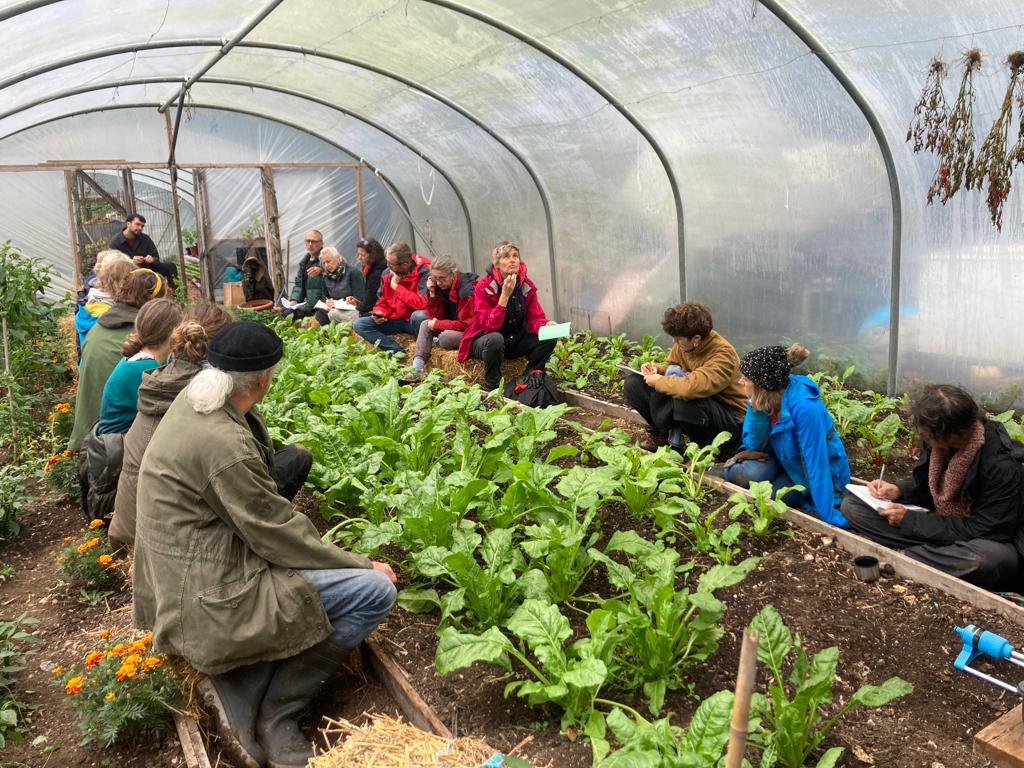
Getting together as Good Food East sussex
What difference does it make if you’re working at a district or borough level, as opposed to operating at a city council level?
Let’s take Brighton & Hove as an example [where Food Matters is based]. It’s a unitary council. That means it’s got the functions of county and the functions of districts and boroughs all wrapped up in one council, so there is only one council to deal with. It’s relatively straight forward to organise at the right level in Brighton & Hove because you are dealing with one council, one body whereas we, in East Sussex have district or borough councils, the County council, and for many town or parish councils too. There are multiple levels at which we need to coordinate and organise, with action needing to happen from county down to neighbourhood level. We need to organise appropriately for these different levels of action, at different tiers.
…and that’s where Good Food East Sussex comes in? You have a collaboration trying to hold some of these different organisations from across the county at different levels?
Yes! If Food Matters hadn’t been commissioned to do it, we’d have had to find a way of doing it in other ways. Things still must happen at the county level. As local coordinators, we are already planning on meeting up in person in May because sometimes, we just need to sit down and be with each other to understand first, how it is for everybody and then second, how we can collectively work better at a county level. How do we share what we’re doing locally? If somebody’s doing something brilliant on their patch, is there something we can learn and apply it to what we already do? Is there something that we can learn from each of our areas that applies across the board that’s countywide? It’s iterative and reflective at the same time.
What has been an outcome of working with Good Food East Sussex for you?
It’s been important having a person / organisation coordinating and holding GFES. It’s an intangible thing…having confidence that something is held well means that you have more space to get on with what you do, because you know the work of this group is progressing. You can turn up at the meetings knowing that they will run smoothly and be well facilitated. Moreover, the people holding this group, this process, aren’t connected to one particular place, which leaves it feeling neutral and open to whatever the different participating groups want to bring. But now we have to think: how do we continue that work together and with East Sussex County Council?
What kind of challenges have you faced trying to come together at county level?
The dynamic between the local and the county-wide structure, because each of the partnerships is held locally, and have a place-based almost neighbourhood-level interest in what they’re doing. I think a challenge has been working out what level of involvement our food partnerships should have in county-wide work – I guess, as well, how much they want to work with the council at county-wide level. It can be difficult bringing together the different worlds of civil society, food activists, and council into a fruitful partnership, working out that balance between local and county, how much you want to pass over ownership of what you’re doing if you’re very passionate about it.
How are you planning to take forward the work of Good Food East Sussex without a group like Food Matters facilitating?
Initially the partnerships are going to meet up without anybody else just to talk about how we go forward: what do we want to do, why do we want to talk to one another? The basics! I don’t know what the outcome will be or the direction, but there is a willingness to meet up and to consider these things. We need to talk to each other, unscripted, unplanned to a degree – probably just sound out what we want from cross-county collaboration and look for the ways we can achieve it. It’s also important to consider how we can influence at county level. There isn’t a solid answer at this point, but we will be re-visiting the action plan put together by Food Matters in collaboration with the partnerships to ensure it reflects the needs and future direction of the communities and other stakeholders in the towns and villages across the county.
We’re certainly excited to see what comes next for GFES! Stay up-to-date with the latest developments by visiting their website here.
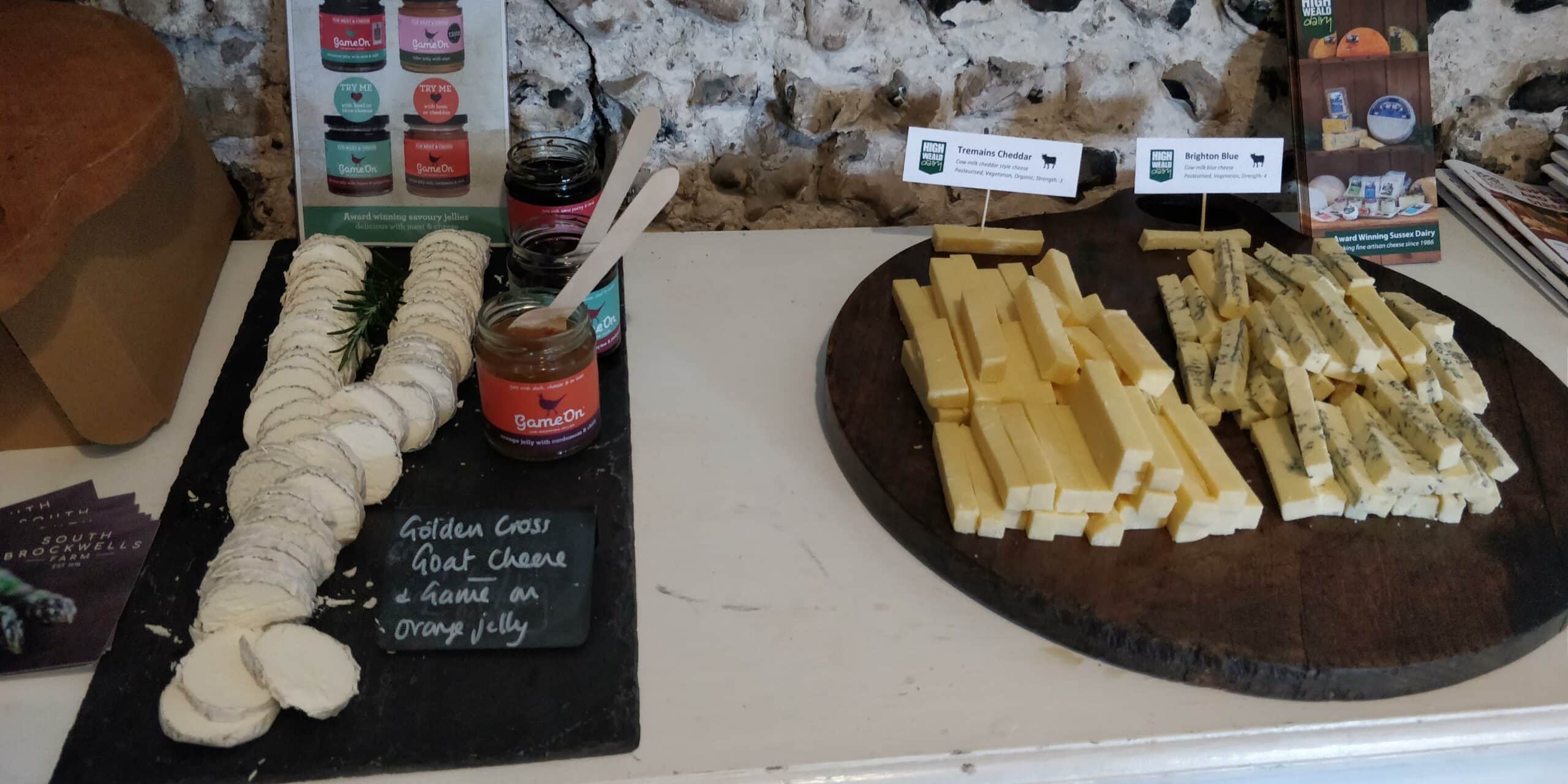
Produce from a Good Food East Sussex buyers and sellers event in March
Blog by Ruth Smart, April 2024
Good Food East Sussex (GFES) is a network of organisations and individuals working together to build a food system that works for people, economy, and environment. GFES recognises that the work of transforming a food system surpasses district or borough lines, and instead involves cooperation at multiple levels: district, county, national, and more.
GFES is organised by the five local district and borough food partnerships that make up the East Sussex area: Lewes, Hastings, Rother, Wealden, and Eastbourne, and until recently was facilitated by us at Food Matters. Food Matters was commissioned to bring the food partnerships together, to identify potential county-level mechanisms for sustainable food system working by facilitating the development of a strategic plan outlining how district and borough-based food partnerships could operate, influence and change at county and regional level.
What did it look like to work as food partnerships at county level? Why was it necessary to do this? What was it like working with us, Food Matters, in this process? Seeking answers to these questions, we spoke to Johnny Dennis of Eastbourne Food Partnership about his experience of the Good Food East Sussex programme, and what lies ahead for the organisations involved in this collaboration.
Johnny, can you tell me about your role at Eastbourne Food Partnership (EFP)and what you do there?
I’m the coordinator at Eastbourne Food Partnership. I’m responsible to the board of directors and I’m responsible for the overall programme of what we deliver and manage in Eastbourne.
Nice. What is the programme that you’re trying to deliver in Eastbourne?
We’re quite new. EFP is a community interest company started about 18-months ago, and I took over in October. Our big plan for this year is to celebrate Good Food Month in October and to have a food event bringing together multiple partners, hopefully on the 4th October. We’re hoping to do this in collaboration with Eastbourne Borough Council, as we continue to build our relationship. We’re trying to foster the idea of a good food culture in Eastbourne because it’s not currently a place that is associated with good food. We want that idea to take up a more prominent position in people’s thinking.
So, why did Eastbourne Food Partnership get involved with the Good Food East Sussex movement?
While the formation of GFES was before my time, it is clear that the act of sharing information and bringing people together is incredibly valuable. Across East Sussex, the food partnerships all work at a local district or borough level, and that can be quite insular – just working in your own community without understanding or being aware of what’s happening at the county tier with the local authority. Moreover, the local authority is responsible for economic development at a more structural level – with procurement and catering at schools, and bigger partnership working with health bodies. That’s where many of the opportunities for working more collaboratively around food happen. Not to be part of these statistics or discussions doesn’t show the whole picture. The opportunities to come together at a county level to discuss and to bring strategic thoughts around what we’re doing is invaluable.
The fact of being in the same room to talk, whether a virtual or real room, has been useful. Building closer connections with the public health team at East Sussex has been invaluable and we look forward to this continuing.

Getting together as Good Food East sussex
What difference does it make if you’re working at a district or borough level, as opposed to operating at a city council level?
Let’s take Brighton & Hove as an example [where Food Matters is based]. It’s a unitary council. That means it’s got the functions of county and the functions of districts and boroughs all wrapped up in one council, so there is only one council to deal with. It’s relatively straight forward to organise at the right level in Brighton & Hove because you are dealing with one council, one body whereas we, in East Sussex have district or borough councils, the County council, and for many town or parish councils too. There are multiple levels at which we need to coordinate and organise, with action needing to happen from county down to neighbourhood level. We need to organise appropriately for these different levels of action, at different tiers.
…and that’s where Good Food East Sussex comes in? You have a collaboration trying to hold some of these different organisations from across the county at different levels?
Yes! If Food Matters hadn’t been commissioned to do it, we’d have had to find a way of doing it in other ways. Things still must happen at the county level. As local coordinators, we are already planning on meeting up in person in May because sometimes, we just need to sit down and be with each other to understand first, how it is for everybody and then second, how we can collectively work better at a county level. How do we share what we’re doing locally? If somebody’s doing something brilliant on their patch, is there something we can learn and apply it to what we already do? Is there something that we can learn from each of our areas that applies across the board that’s countywide? It’s iterative and reflective at the same time.
What has been an outcome of working with Good Food East Sussex for you?
It’s been important having a person / organisation coordinating and holding GFES. It’s an intangible thing…having confidence that something is held well means that you have more space to get on with what you do, because you know the work of this group is progressing. You can turn up at the meetings knowing that they will run smoothly and be well facilitated. Moreover, the people holding this group, this process, aren’t connected to one particular place, which leaves it feeling neutral and open to whatever the different participating groups want to bring. But now we have to think: how do we continue that work together and with East Sussex County Council?
What kind of challenges have you faced trying to come together at county level?
The dynamic between the local and the county-wide structure, because each of the partnerships is held locally, and have a place-based almost neighbourhood-level interest in what they’re doing. I think a challenge has been working out what level of involvement our food partnerships should have in county-wide work – I guess, as well, how much they want to work with the council at county-wide level. It can be difficult bringing together the different worlds of civil society, food activists, and council into a fruitful partnership, working out that balance between local and county, how much you want to pass over ownership of what you’re doing if you’re very passionate about it.
How are you planning to take forward the work of Good Food East Sussex without a group like Food Matters facilitating?
Initially the partnerships are going to meet up without anybody else just to talk about how we go forward: what do we want to do, why do we want to talk to one another? The basics! I don’t know what the outcome will be or the direction, but there is a willingness to meet up and to consider these things. We need to talk to each other, unscripted, unplanned to a degree – probably just sound out what we want from cross-county collaboration and look for the ways we can achieve it. It’s also important to consider how we can influence at county level. There isn’t a solid answer at this point, but we will be re-visiting the action plan put together by Food Matters in collaboration with the partnerships to ensure it reflects the needs and future direction of the communities and other stakeholders in the towns and villages across the county.
We’re certainly excited to see what comes next for GFES! Stay up-to-date with the latest developments by visiting their website here.

Produce from a Good Food East Sussex buyers and sellers event in March
